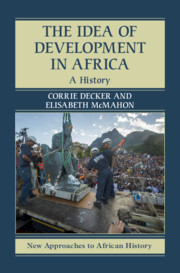Book contents
- The Idea of Development in Africa
- New Approaches to African History
- The Idea of Development in Africa
- Copyright page
- Contents
- Figures
- Tables
- Maps
- Boxes
- Acknowledgments
- Maps
- Introduction
- Part I Origins of the Development Episteme
- Part II Implementation of the Development Episteme
- Chapter 5 The Salvation of Science
- Chapter 6 Challenges to Development
- Chapter 7 From Modernization to Structural Adjustment
- Chapter 8 The New Missionaries
- Part III “Problems” in the Development Episteme
- Epilogue
- Bibliography
- Index
- References
Chapter 6 - Challenges to Development
from Part II - Implementation of the Development Episteme
Published online by Cambridge University Press: 16 October 2020
- The Idea of Development in Africa
- New Approaches to African History
- The Idea of Development in Africa
- Copyright page
- Contents
- Figures
- Tables
- Maps
- Boxes
- Acknowledgments
- Maps
- Introduction
- Part I Origins of the Development Episteme
- Part II Implementation of the Development Episteme
- Chapter 5 The Salvation of Science
- Chapter 6 Challenges to Development
- Chapter 7 From Modernization to Structural Adjustment
- Chapter 8 The New Missionaries
- Part III “Problems” in the Development Episteme
- Epilogue
- Bibliography
- Index
- References
Summary
Chapter 6 takes a close look at the watershed moment of World War II to show how Africans’ demands for better working conditions, greater political participation, and more social services pressured European nations to reform the development episteme. Economic hardship during the war intensified African vulnerability to poverty, malnutrition, and disease. Britain passed the new Colonial Development and Welfare Act (CDWA) in 1940, and France followed suit with the establishment of the Fonds d’Investissement pour le Développement Economique et Social (the Investment Fund for Economic and Social Development) (FIDES) in 1946. Unlike pre–World War II colonial development policies that demanded self-sufficiency, these initiatives provided significant metropolitan funding for economic and social programs in Africa without the stipulation that they result in a direct return on investment. European colonial development in Africa was no longer simply investment in colonial industries; now it claimed to promote the welfare of African people. Imperial powers envisioned postwar development as a solution to growing dissent in Africa and budding anticolonial movements across the globe at the end of the war. The new colonial development policies signaled a desperate attempt to keep colonialism alive at a time when it seemed perilously out of date.
Keywords
- Type
- Chapter
- Information
- The Idea of Development in AfricaA History, pp. 122 - 142Publisher: Cambridge University PressPrint publication year: 2020

